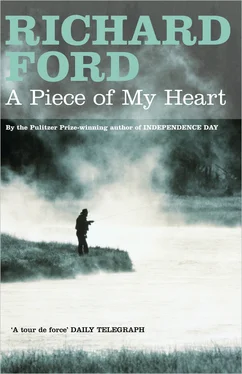Richard Ford - A Piece of My Heart
Здесь есть возможность читать онлайн «Richard Ford - A Piece of My Heart» весь текст электронной книги совершенно бесплатно (целиком полную версию без сокращений). В некоторых случаях можно слушать аудио, скачать через торрент в формате fb2 и присутствует краткое содержание. Год выпуска: 1976, Издательство: Bloomsbury Publishing, Жанр: Современная проза, на английском языке. Описание произведения, (предисловие) а так же отзывы посетителей доступны на портале библиотеки ЛибКат.
- Название:A Piece of My Heart
- Автор:
- Издательство:Bloomsbury Publishing
- Жанр:
- Год:1976
- ISBN:нет данных
- Рейтинг книги:3 / 5. Голосов: 1
-
Избранное:Добавить в избранное
- Отзывы:
-
Ваша оценка:
- 60
- 1
- 2
- 3
- 4
- 5
A Piece of My Heart: краткое содержание, описание и аннотация
Предлагаем к чтению аннотацию, описание, краткое содержание или предисловие (зависит от того, что написал сам автор книги «A Piece of My Heart»). Если вы не нашли необходимую информацию о книге — напишите в комментариях, мы постараемся отыскать её.
A Piece of My Heart — читать онлайн бесплатно полную книгу (весь текст) целиком
Ниже представлен текст книги, разбитый по страницам. Система сохранения места последней прочитанной страницы, позволяет с удобством читать онлайн бесплатно книгу «A Piece of My Heart», без необходимости каждый раз заново искать на чём Вы остановились. Поставьте закладку, и сможете в любой момент перейти на страницу, на которой закончили чтение.
Интервал:
Закладка:
Buck would come down late in the evening, drink a pint of whiskey, and sit on the one claw-toed chair the pump cabin had and talk about the old man.
Buck said that the old man had come down sometime in 1941, from Republican City, Nebraska, had sold his half of his father’s pig farm to his brother Wolfgang and moved himself and two steamer trunks on the train to Little Rock and put himself up in a commercial hotel at the foot of the Main Street bridge and bought himself a Buick coupe and drove all over the country between Little Rock and Memphis looking for cheap land. And after not very long, Buck said, he bought eight hundred acres of swamp fifteen miles back out of Hazen, land that no farmer had even thought to abandon, much less cultivate, since La Fourche Creek ran straight through the middle of it and flooded every spring, leaving a solid counterpane of silt and randy water on top of the entire parcel so that even the rice farmers had given up on it and just kept it for duck hunting. He said that Rudolph, who was in his thirties and strong as a bulldog, had gotten hold of the land and practically gnawed every tree on it with his own teeth and built up a maze of bar ditches and ramparts and iron sluice gates to channel the water out of the lows and into an old dead-tree reservoir he dug out with three World War I scoopers. In a year’s time he had gotten the land set up to be a farm, built a two-story shingle house and a metal windmill, and transported an Austrian man and his family down from Republican City to live on it and run the farm, and promptly moved himself out of the commercial hotel and into the R. E. Lee on Markham Street and fell in love with the lady who owned it and six more like it in Memphis and Shreveport, and whose husband had been drowned falling out of an inner tube on Lake Nimrod, leaving it all to her.
Buck said that before very long Rudolph had communicated his feelings to the lady, a small wiry red-haired woman named Edwina, and that they were married in the hotel lobby with a bang, and that right away Rudolph moved up to her suite on the eleventh floor and started ordering baskets of fruit and cases of whiskey and running the bellboys up and down the elevators bringing him one thing after another, until Edwina had to tell him the hotel was for other things than just to make him happy.
When the farm started making more money than he could count (though not more than he could save), Rudolph began carrying Edwina’s friends to shoot ducks on the big reservoir or back in the woods where he had left the water standing in the winter. Though, Buck said, every time he did it he arranged to get mad and raise hell with everybody for driving too fast on the gravel roads that he had graded personally, or for killing suzies instead of greenheads, or for some infraction of the rules that he was making up as he went along, and finally ran all her friends off entirely when they wouldn’t do things the way he wanted them done, though Buck said it was hard to figure out just how that was. He began carrying an old steel-barrel 12-gauge across the seat of his car as a convincer when he came on somebody he didn’t like or wanted to run off. And all the time living in Little Rock like a caliph and staying up in the suite drinking Evan Williams and eating fruit and ordering people around including Edwina, and making everybody wish they had never seen him.
Buck said it didn’t seem like any time until Edwina had him divorced and married herself off to an Italian named Tarquini who was fifteen years younger than she was and wore his suits halfway up his asshole, and whom Rudolph had taken out to the farm two separate times before he found out what was happening on the days he stayed at the farm by himself and left Edwina to her own devices. Buck said Tarquini was just some interior decorator from Chicago that Edwina had hired to re-deluxe her hotels, but couldn’t resist getting in the sack with since she and Rudolph weren’t seeing things eye to eye.
In the settlement Rudolph made Edwina donate him a room in the R. E. Lee for life and one free meal a day, and when it was over he went back down to Hazen, where he could go to the farm when he wanted to and drive his old grader down the roads and along the bar ditches and run everybody off he didn’t like and spend time figuring out just what had happened to him.
Buck said he guessed the old man probably used the farm to get back at Edwina by just never inviting anybody she ever knew or that he ever knew when he knew her to hunt with him, and by paying him, Buck, to take people in and out all winter for a thousand dollars a season and letting that information get back to Edwina by mentioning it to the waiters in the dining room when he came into town to eat his free meal and stay in his free room.
He said the old man would come down to the cabin late at night and have a bottle of Williams and an old R. E. Lee Hotel glass and pour Buck a level and watch him drink it, then sit back and cry like a baby. Buck said he had to just keep on drinking until it was gone, because he couldn’t stand listening to the old man cry and tell the story over and over again. Finally, he said, he’d tell Rudolph his was just a clear case of bad timing, and then go to sleep. The old man sat there, he said, staring out the screen door into his rice fields not able to sleep because he had a problem he couldn’t understand. And Buck said that he never would have drunk so much if it hadn’t been for all those nights.
He walked around to the side of the house and knocked on the door, thinking he could ask what had happened to the old man and go on. The old woman came to the screen and smiled as if she recognized him, and said Rudolph still had his rooms.
He thought he ought to forget it and go back. He smiled at the woman and she pushed open the screen and he got inside before he knew it and she pointed up the narrow hallway to the upstairs, and he went up. He felt like he was making a mistake acting like he wanted to see the old man when he didn’t want to at all, and was disappointed to know he was alive still, when he shouldn’t have been alive at all. The door at the top was closed, and a thin pane of light radiated over the sill. He could hear the woman reading her newspaper out loud in the kitchen and the sound of her chair groaning.
He knocked and the old man said to come in, standing in the middle of the room under a hanging bulb, wearing poplin pants and no shirt, staring wild-eyed as if he were getting ready to make a charge. He looked heavy-chested and bent to one side, his white hair stuck up in tussocks over his ears. He regretted ever coming inside.
The room was sour. The old man looked at him intently, as if he thought he recognized him, the way the old woman did, but couldn’t be sure.
“See Minor,” he said suddenly, “about the work. Don’t see me.”
“No sir,” he said, and pressed back against the molding of the door, thinking about getting out.
“Who is that?” Rudolph said, and stepped up under the bulb.
“Hewes,” he said. “I used to work on number two.”
The old man got a step closer. “Took off without saying whoop-dee-doo, too,” the old man shouted, like it had happened last night. “I come out a week later wonderin where in the shit you was, and there was my house wide open, lights burning, propane still in the pipes.” He took a step back and humped down beside his desk table. “What do you say about that?”
“I had to leave of a sudden,” he said, fixing his eyes on the single closed window behind the old man’s head.
“Well, there ain’t no more house!”
“What come of it?” he said.
The old man squinted as if he had just decided he was really somebody else. “Remember Buck Bennett?”
“Yes sir.”
“Buck Bennett was a crazy son-of-a-bitch. You remember that?” The old man smiled companionably as if he could see Buck at that very moment drunk and falling down.
Читать дальшеИнтервал:
Закладка:
Похожие книги на «A Piece of My Heart»
Представляем Вашему вниманию похожие книги на «A Piece of My Heart» списком для выбора. Мы отобрали схожую по названию и смыслу литературу в надежде предоставить читателям больше вариантов отыскать новые, интересные, ещё непрочитанные произведения.
Обсуждение, отзывы о книге «A Piece of My Heart» и просто собственные мнения читателей. Оставьте ваши комментарии, напишите, что Вы думаете о произведении, его смысле или главных героях. Укажите что конкретно понравилось, а что нет, и почему Вы так считаете.












